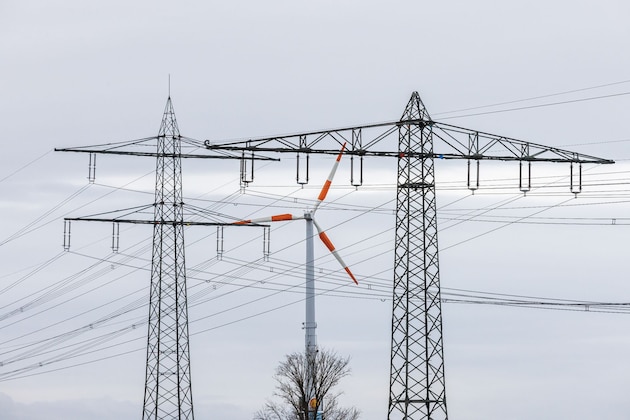The Federal Network Agency sees the German power supply as secure until 2031 – even with an earlier phase-out of coal and higher consumption. For this, however, renewable energies, for example, must be further expanded significantly. That’s the problem, associations criticize.
The power supply in Germany would be secured in the medium term even if coal were phased out completely and despite higher consumption, for example by electric cars. This is the result of a report by the Federal Network Agency, which was presented and approved by the Federal Cabinet on Wednesday.
“This also applies under the condition that the exit from coal, which has been agreed for the East German coalfields in 2038, should be brought forward,” said Economics Minister Robert Habeck (Greens) in Berlin. The German energy supply is secure, and sufficient electricity will be available at all hours of the year.
The traffic light coalition had agreed to “ideally” bring the phase-out of coal forward to 2030 in order to prevent the emission of climate-damaging carbon dioxide. So far, however, an eight-year early exit has only been decided in the Rhenish Revier. In the districts in East Germany it is still controversial.
Habeck had already spoken out in favor of an earlier exit from coal in the east – but at the same time emphasized that an earlier exit had to be agreed by consensus. The government’s decision that the three remaining nuclear power plants will be shut down in mid-April is also controversial.
The analysis by the Federal Network Agency takes into account not only the higher electricity consumption – for example for e-cars, heat pumps and electrolysers – but also the federal government’s expansion targets for renewable energies. “Of course, it is logical that the measures must be implemented,” said Habeck. Because they would – as the report shows – lead to a secure, inexpensive, but above all climate-neutral energy system.
Regarding an earlier phase-out of coal, the report states that this is possible without affecting the security of supply. However, the amounts of energy from coal would have to be compensated for in other ways in order to maintain the level of security of supply. This is done through the expansion of low-emission electricity production capacities such as natural gas-fired, hydrogen-capable power plants or renewable energies. The Federal Government intends to present a “Power Plant Strategy 2026” in the near future, which is intended to set the framework for the construction of new power plants before the end of this decade.
The planning and approval of new power lines should progress more quickly. “Everything together – accelerated grid expansion, accelerated ramp-up of renewable energies, and just for the gaps that will remain, to design and produce the power plant park – is the task until 2030. And then the supply will be secured,” said Habeck.
The Federal Government publishes the report on monitoring the security of supply of electricity every two years. The current paper examines the period from 2025 to 2031. The report therefore considers the developments that can be expected for the market and the grid, but does not aim to analyze crisis scenarios. It should therefore be clearly separated from the parallel needs and system analyzes of the transmission system operators. This is currently being developed and will be presented in April, it said.
FDP parliamentary group leader Lukas Köhler told the German Press Agency that the current report shows that security of supply is guaranteed under optimal conditions. “However, it would be negligent to rely on the fact that all politically set goals will actually be achieved.” The expansion of gas-fired power plants and the ramp-up of the hydrogen economy would be decisive for a secure and affordable electricity supply. “We urgently need appropriate investment incentives for this.”
The Stadtwerkeverband VKU explained that the positive forecasts of the Federal Network Agency are currently too optimistic. “The speed at which renewable energies are expanded must be tripled compared to the current level in order to achieve the renewable capacity targets on which the report is based,” said association leader Ingbert Liebing. But there are problems with the implementation.
The Federal Association of Energy and Water Management also sees immense challenges. Without improved framework conditions, the goals can hardly be achieved, said the head of the association, Kerstin Andreae. Germany must make a spurt at an unprecedented speed if the transformation to a climate-neutral electricity system is to be achieved by 2035 while at the same time phasing out coal by 2030. The necessary significant expansion of hydrogen-capable gas power plants and biomass plants is currently not realistic.
The Federal Association of Renewable Energy (BEE), on the other hand, criticized the construction of new gas-fired power plants as a “dead end”. The fluctuating energy production from wind and senses can be covered completely from renewable sources, for example using the existing bioenergy plant park, green combined heat and power or hydropower, said BEE President Simone Peter. Incentives for new fossil fuel infrastructures stand in the way of a sustainable power plant strategy.
Union parliamentary group leader Jens Spahn criticized the report as “politically motivated” optimism. It is based on assumptions such as an increase in gas-fired power plants or a tripling of the expansion of renewable energies. But you don’t see much of that, said Spahn to the news portal “ZDFheute.de”. “I would wish for fewer health prayers and more concrete action, because 2030 – that’s soon. And we certainly need reliable electricity and energy for Germany.”








